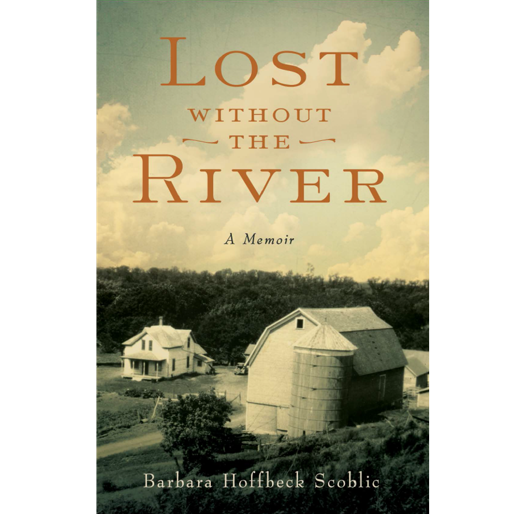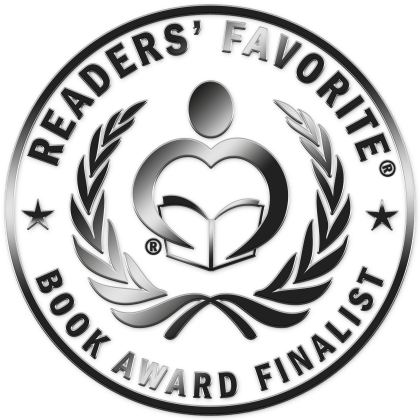Lost Without the River, A Memoir
Lost Without the River is an elegantly wrought memoir of resilience, courage, and reinvention. A portrait of nature at its most beautiful and demanding, it is the story of a girl whose family struggled against Depression-era hardship and personal tragedy to carve out a small farm in rural South Dakota. The youngest of seven, Barbara wrestles against the expectations of her family, the strictures of the church, and the limits of a time dominated by men. Eager for adventure, she leaves the farm—first for the Peace Corps and ultimately for the alien geography of Manhattan’s Upper East Side—but she never truly escapes. Lost Without the River demonstrates the emotional power that even the smallest place can exert, and the gravitational pull that calls a person back home.
Praise for the Book
"With its map of the family farm, its photograph of the Whetstone river, and its portrait gallery, Scoblic's memoir is both a micro-history of her tiny corner of South Dakota and an oral-history-toned chronicle of the Hoffbeck family from the 1920s onward....Scoblic's picturesque language...keeps sentimentalism at bay..."
—The New York Times
“Scoblic...is as talented with words as her mother was with a wood burning stove...”
—Bernie Hunhoff, South Dakota Magazine
"Enter Barbara Scoblic's world where opera reigns in the kitchen on Saturday afternoons, where the winter is long and loss is real. Her writing beautifully teases up the questions of life, love, and how much of a hold our past really has on us."
— Marion Roach Smith, author of The Memoir Project: A Thoroughly Non-Standardized Text for Writing & Life
“Compelling and thought-provoking, Lost Without the River is a highly polished memoir with enormous heart. In the candid pages, author Barbara Hoffbeck Scoblic shares a deft account of Depression-era farm life. Delivered in a warm style, her engrossing story of familial bonds—that sometimes chafe—is compelling and well-paced. And though it's desperately sad at times, the overriding theme is one of hope and resiliency."
—Laurie Buchanan, PhD, author of Note to Self: A Seven-Step Path to Gratitude and Growth, and The Business of Being: Soul Purpose In and Out of the Workplace
“Barbara Hoffbeck Scoblic's Lost Without the River: A Memoir is about growing up on the family farmstead in South Dakota, and of the strong and continuing influence of those years and the farm itself long after she leaves home. In 1926 her parents, Roy and Myrtle Hoffbeck, moved to the farmstead in the Big Stone City area. The Whetstone River runs right through the farm. Scoblic, the youngest of the seven Hoffbeck children, writes of life on the farm from the 1930s to the 1960s. The chapter titles reflect everyday life, farming, weather, floods, the Great Depression and the Great Drought. The stories are about family love, personal courage, resilience, and a love for nature. The farm was sold in the 1970s. After her parents passed away, she and her siblings continued to visit the Big Stone City area.
I found Barbara Hoffbeck Scoblic's memoir absorbing and fascinating. I loved the sketches and vivid descriptions of the farmland, the Whetstone River with its Big Rock, and its bridges; the gentle hills and prairies with wildflowers. The river was a place for swimming, fishing, and solitude. It also posed a grave danger in times of floods. I loved the delightful titles Scoblic gives to two floods that she recalls: "The Year the Chicken Coop Floated Down the River" and "The Year the Bridge Went Out". I loved the contemplative and thoughtful nature of her poems about family and farm, the passage of time, of love and loss: "Dirt" and "Dirt Revisited", "Mourning Dove" and "Lost". I admired the courage and strength with which she writes of her sister Dorothy, of her conflicts with her dad, of doubts about being a farmer, and finding her place in life.”
—Saifunnissa Hassam for Readers' Favorite
“This volume of reminiscences charts not just the stories of [Scoblic’s] youth, but also the ways those things have shaped and weighed on her throughout her adulthood. The author’s prose is lyrical and highly observant…”
—Kirkus Reviews
“Scoblic has captured something universal here. There is a quietude to this memoir that speaks to the Northern Plains, but the themes exist everywhere… A longtime resident of New York City, Scoblic mines the theme of the power of place, specifically the river that traced through their farm.”
—Minneapolis Star-Tribune
"There are some writers who can sing the song of even a small and remote place and through some magic transform it into a siren call. Barbara Scoblic is one of those writers!"
— Lewis Frumkes, director of The Writing Center at Hunter College
“Her large farming family was always in flux, hardworking and bone weary, yet there is a quiet intimacy conveyed in the lean prose of Barbara Scoblic’s memoir, where simple gestures, like ironing blouses before a sister leaves for college, carry unspoken love and yearning.”
— Elizabeth Garber, author of Implosion: A Memoir of an Architect's Daughter
“Barbara Scoblic's Lost Without the River is a virtual literary symphony fusing memoir, history, and geography. Her descriptions of South Dakota's farms, rivers, and glacial lakes are as vivid as her portraits of three generations of her family and their relationships. She may have achieved a modern classic—with a touch of the poet!”
— Sidney Offit, author of Memoir of the Bookie's Son
From birth, Dorothy’s world is confined to a crib, the victim of a botched forceps delivery at the hands of an alcoholic doctor.
Dorothy and the author escape being farmed out to more prosperous family members, so the tenderness she feels for her sister falls just short of poignancy, leaving the reader with renewed understanding about just how harsh agrarian life was less than 100 years ago.
At least three poems are included as part of this memoir and their titles convey the predominant feelings that are the undercurrent of this book. “The Mourning Dove,” are the musings of a small child, “Lost” is a memorial to her mother but “Dirt, Revisited” may inadvertently summarize Scollbic’s ambivalence about her early life:
“Cleaning dirt from under my fingernails
before dressing for the prom….
Damned dirt
Blessed dirt.”
Scolbic returns to Big Stone City on several occasions but mostly alone, notably leaving her children at home in New York. In the end, her visits are limited to the cemetery, where once again, memories resurface, and as she records them in this memoir, what seems like an unspoken promise to record them is finally kept. “In my quest, I’ve asked questions, listened, and taken notes; returned and researched; dreamed and remembered. And now, at last, the stories are written.”
—Anna Gilgoff for Hippocampus Magazine




